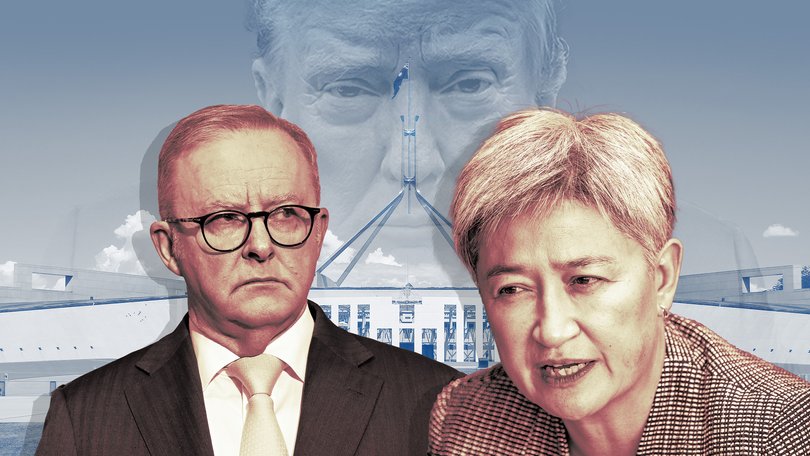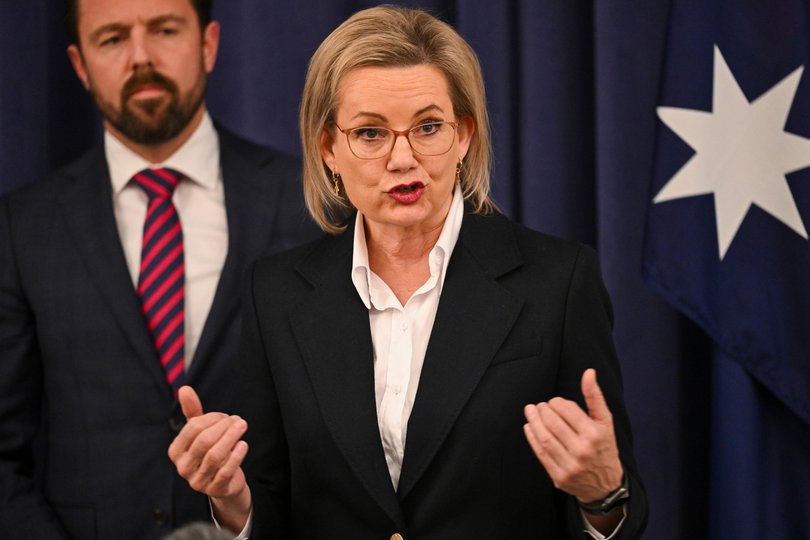Donald Trump trade war: Albanese under fire in Question Time over inaction on looming tariff deadline
Anthony Albanese has been accused of “running up the white flag” on the tariff fight after Donald Trump threatened to double the global baseline levy to 20 per cent.

Anthony Albanese has been accused of “running up the white flag” on the tariff fight after Donald Trump threatened to double the global baseline levy to 20 per cent.
Mr Trump had revealed in Scotland overnight he was considering ramping up the baseline tariff to “somewhere in the 15 to 20 per cent range” from the 10 per cent he had planned for many countries, including Australia.
“I just want to be nice,” Mr Trump said about the potential new tariff range. “Probably one of those two numbers.”
Sign up to The Nightly's newsletters.
Get the first look at the digital newspaper, curated daily stories and breaking headlines delivered to your inbox.
By continuing you agree to our Terms and Privacy Policy.The latest twist in the unpredictable flow of trade levies emerging from the White House appeared to take the Government by surprise just weeks after Mr Trump also flagged the possibility of a 200 per cent tariff on pharmaceuticals, one of Australia’s biggest exports to the US.
“(It’s) only happened in the last hour or two, as I’ve been looking at my phone. This is the nature of some of these trade positions from the US administration,” Health Minister Mark Butler said on Tuesday morning when asked about Mr Trump’s statement.
He said the Government was still probing the nature, timing and scale of tariffs that might be imposed on pharmaceuticals, but was continuing to “prosecute Australia’s national interest and reinforce the importance of free trade”.
Opposition Leader Sussan Ley would not be drawn on directly criticising the US President on Tuesday for his latest tariff comments, instead shifting the focus to Anthony Albanese for “running up the white flag” and failing to secure a carve-out given he had failed to personally meet Mr Trump.
“I just regret the way the government seems to be shrugging its shoulders as if there is nothing they can do to address the tariff situation,” she said.

“It is not good enough that all these months after Donald Trump became President, the vital meeting between Anthony Albanese and the President has not taken place.”
Ms Ley highlighted that at least 20 world leaders had met with the US President to negotiate a deal.
“In this increasingly digital, interconnected world, the face-to-face meeting matters and it makes a difference and it’s the way the President does business. And it is something Anthony Albanese does not seem to be stepping up to do,” she said.
“What is his plan? How much longer do we have to have a situation where we haven’t had that face-to-face meeting.”
No country has secured a full exemption from the tariff regime that has upended global trade norms, and the Government has consistently argued that Australia is subject to the lowest rate of 10 per cent, while also accusing the US of an act of economic “self-harm.”
But several other nations have reached trade deals through formal trade agreements, including the UK, Japan, Indonesia, Vietnam and the Philippines.
A trade deal was struck between the European Union chief Ursula von der Leyen and Mr Trump at the Turnberry golf course in Scotland this week, which slashed previous 30 per cent export taxes. But the EU bloc still faces 15 per cent tariffs on the goods it sells to the US.
The Government said on Tuesday it would continue to push for a full exemption from the tariff regime ahead of Friday’s deadline when it is expected to take effect worldwide after a delay imposed by the US President in April to allow time for negotiations.
In a feisty Senate exchange, Foreign Minister Penny Wong hit back at the Coalition for what she complained was “aggressively yelling from the sidelines” rather than working constructively with the Government towards a deal.
“It is clear that President Trump envisages a different role for the US and the world, and that includes in relation to trade,” Senator Wong said.
“What I would say is we can be confident of our ability to navigate these changes together. It is disappointing that the Coalition have no interest in working together.”
When pressed by shadow foreign minister Michaelia Cash during Senate question time whether Australia would be subjected to 10, 15 or 20 per cent tariffs, Senator Wong responded that the US position was “still being determined.”
The Foreign Minister said Australia was “confident of our competitive position,” adding that the Government made a “great effort” to open up more markets in the region and further afield, including with China and the United Arab Emirates.
Senator Wong argued Australia was in a “relatively better position” than some of the countries whose leaders had met with Mr Trump.
“No one has a lower reciprocal tariff than Australia, and that obviously has relevance, not less politically, but more economically, because the relative position of Australia is a strong position,” she said.
“I would say to Senator Cash, this is a challenging time, and it is time for some responsible behaviour from the Coalition.”
Trade Minister Don Farrell said the Government had adopted a “watch and wait” strategy, indicating there had been no notification of any changes from the current 10 per cent tax.
“Our position is unchanged — any tariffs on Australian goods are unjustified and an act of economic self-harm,” a spokesperson for Senator Farrell said.
“We will continue to engage at all levels to advocate for the removal of all tariffs, in line with our free trade agreement with the United States.”
Business leaders have so far backed the Government’s approach to the Trump administration’s tariffs.
One executive, speaking off-the-record as the situation was at a “sensitive stage,” said there were open lines of communication between the Government and business and close coordination to achieve the best possible outcomes.
“There are a number of scenarios and unknown factors that could influence what happens next,” he said.
Bran Black, chief executive of the Business Council of Australia, said he hoped that in due course an agreement could be reached with the US.
“But we would urge the continuation of the Government’s methodical approach to managing this issue. It’s better to take the time to get a deal right than rush to an agreement, for the sake of saying we’ve done so,” he said.
“We know the Government is consistently and strongly putting the case why Australia should be exempt from these tariffs, particularly because of our ongoing trade surplus and long-standing strategic ties.”

